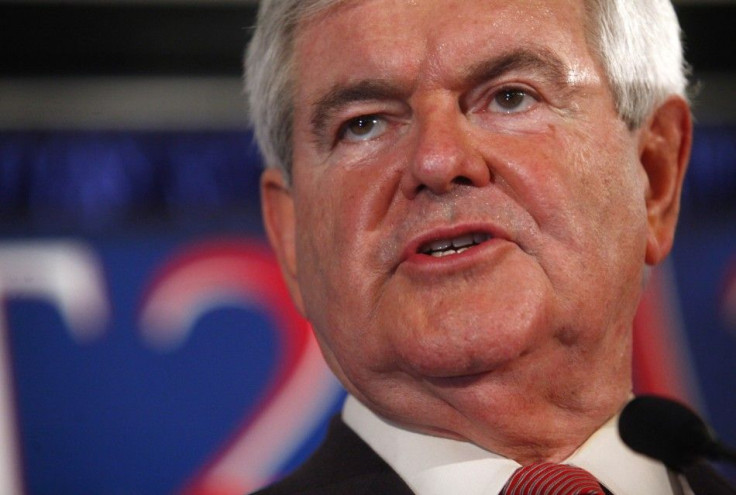Newt Gingrich's Biggest Liability
COLUMN

Fresh off his South Carolina primary win, one candidate has energized conservative Republicans -- giving them hope that someone of their ideological bend can secure the 2012 Republican Party nomination for U.S. president. That candidate, of course is former House Speaker Newt Gingrich, who has risen like the proverbial phoenix from the ashes.
Gingrich has the party's conservative faction, including the Tea Party faction, thinking that they have a big-league candidate capable of matching President Barack Obama's gravitas. And Gingrich also has demonstrated that he has the communication skills required of front-runner presidential candidates.
Gingrich is also the only, viable conservative left standing after a laborious, beyond-repetitive, interminably-incendiary GOP candidate review gauntlet that started too early and is ending too late. And in the process, that unwieldy review revealed the flaws of a series of conservative candidates -- from lack of executive experience, to too little debate preparation / knowledge of the issues, to a lack of understanding of the federal government's operations.
2012 GOP Field Thins-Out
Moreover, Gingrich's rough and inauspicious start, in retrospect, looks like a savvy strategy (although he certainly didn't plan it that way): lay low, and let all the lightweights, rookies, and wannabes shoot themselves in the foot, then start talking when there are few people left standing.
To be sure, Gingrich's rise to nomination contender status is hardly the stuff of a strategic, methodical, 10-year plan to secure the nomination, but his campaign's slow early start, nevertheless, looks like the stuff of an astute chess player.
The recipient of good fortune or not, Gingrich is now neck-and-neck with former Massachusetts Gov. Mitt Romney -- Gingrich leads Romney 33.7 percent to 33.0 percent in Florida, in the latest realclearpolitics.com average of polls. Hence it's appropriate to ask a key question pertaining to the presidency in the modern/postmodern era: Is Gingrich too old to be president?
U.S. Presidency: A Unique Office
Other than the U.S. Constitution-required age 35, there is, of course, no age limitation for the U.S. president. Even so, due to the enormous demands placed on the person -- there is no office in the world quite like the U.S. presidency -- the job appears to be better-suited for elected officials in a certain age category, as opposed to others.
Further, in a sense, the American people ask too much of their president...asking -- demanding really is a better word -- that he/she perform at a high level in roles that are disparate, dynamic, and frequently, conflicting.
Decades ago, the late, great Cornell University Historian/Political Scientist Clinton Rossiter, arguably the greatest U.S. presidential studies scholar ever, first conceptualized this unique burden the U.S. president shoulders in his book The American Presidency, (New York: Harcourt, Brace, 1956).
In it, Rossiter said the U.S. president performs 10 roles, and from the scholar's breakthrough conceptualization one can get a sense of the demands placed on the resident of 1600 Pennsylvania Avenue. Rossiter argued that the president is the chief executive, chief legislator, commander in chief of the U.S. armed forces, chief diplomat, economic manager, leader of the free world, protector of the peace of U.S., tribune of the people, chief of state, and head of a political party.
Performing well in the commander in chief, protector of the peace, chief diplomat, and economic manager roles is the stuff a renaissance professional; add the other roles, and one can sense the stress inherent in this demanding, uniquely-American office.
What's The Right Age to Assume the Presidency?
For the above reasons, and others, a president should be, ideally, chronologically be in his late 40s or early 50s, but above all possess the mental function, self awareness, alertness, energy level, and stamina of someone in the prime of life.
The prototype would be President Bill Clinton, who was inaugurated at age 46 or President John F. Kennedy, inaugurated at age 43, or President Franklin D. Roosevelt, inaugurated at age 51.
Of course, there is no guarantee that someone elected at a younger age will be better-equipped mentally for the office than someone older, but the demands/stress of the presidency are such that we can see how a person in the their late 40s / early 50s would be more likely to meet the enormoust demands of the job than someone in their late 60s / early 70s, all other factors being equal.
The second term of President Ronald Reagan, who started the term at age 73, comes to mind, when Reagan's alertness was less than his first term, most historians agree. Also, of course, one can cite FDR's final term, his fourth, one characterized by declining health; FDR passed away while in office at age 63.
In President Reagan's defense, Reagan was a remarkably-fit age 69 individual when he was inaugurated in 1981. That said, Reagan did not escape aging's effects or the Oval Office's stress that impact all presidents, and those effects showed late in his second term.
With the above as a backdrop, where does Gingrich, who in January 2013 would be age 69, sit?
One could make a strong argument that Gingrich is too old to be president. True, the presidency of 2013 -- unless the geopolitical landscape changes substantially before then -- will not have the acute tension/stress of the Cold War era, but every other responsibility/demand that scholar Rossiter listed remains.
And that suggests that candidates in their late 40s / early 50s will remain best-suited for the U.S. presidency, all other factors being equal.
- -
© Copyright IBTimes 2024. All rights reserved.





















